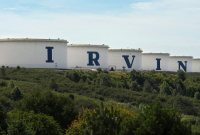Support strong Canadian climate journalism for 2025
"So why have you come to Penn State?" the Uber driver was asking me, as we drove among the verdant undulating hills of rural Pennslyvania on the way to my motel. I had just been picked up at the tiny State College airport, the town where the University of Pennsylvania resides.
With 100,000 students, Penn State has been infamous in recent years for its college football program and the Jerry Sandusky child abuse scandal. So when I told the driver I was there to interview Michael Mann for a documentary I was making, I assumed he had never heard of the climate scientist. But he had. "Oh yes, he is quite well known around here," the driver said.
I had flown to Pennsylvania to meet with Mann this past August, not really appreciating just how famous he was. And that's because Mann had been at the center of a scandal too - but a very different one. This involved powerful corporate forces and their front groups and minions in the right-wing press, and some ruthless Republican politicians.
I had just begun filming a 30-minute documentary for The Real News Network about the billionaire oil tycoons, the Koch brothers, and their war against climate science and the US political system. Mann was near the top of the list of people I wanted to interview because he'd run straight into the buzzsaw of the Koch brothers' political apparatus a few years ago.
Mann, who is a professor of atmospheric science and the director of Penn State's Earth System Science Center, is most famous for a graph he once drew. In the late '90s, he and one of his colleagues published a paper that tracked global temperatures going back not decades, but centuries. That paper included a graph which showed temperatures shooting straight up beginning in the late 1800s and continuing to this day.
It became known as the "hockey stick curve" and a potent symbol against any claims global warming was a myth.
"You don't have to understand the inner workings of the Earth's climate system to understand what this graph is telling us," said Mann when we met. "What it shows us is that the recent warming is this unprecedented spike that has no counterpart as far back as we can go in the record. And it really communicated, I think, to a very large audience the fact that climate change is real, that we are changing the climate in profound ways through the burning of fossil fuels."
Naturally, of course, the oil industry was not pleased with Mann's handiwork. And he soon became one of the climate scientists they set out to destroy. Their opportunity arose in 2009 when internal emails among climate scientists were hacked and released on the eve of the Coppenhagen climate summit. The right-wing media and oil industry apologists fastened on certain emails that referenced Mann, claiming they showed the scientists were exaggerating the reality of climate change.
They launched a full-bore campaign to have Mann fired and discredited - attacking him in on-line and newspaper ads, in columns and on Fox TV, and sending him death threats. Republican politicians demanded he hand over internal emails and sought to investigate him for scientific fraud. A former CIA caseworker even offered up $10,000 if Mann's colleagues would step forward and accuse him of fraud. He once received an envelope filled with white powder that had to be investigated by the FBI (it was not a dangerous substance, in the end).
"There was a veritable price on my head in the sense that there were people who were putting out bounties for those who could destroy me," Mann told me. He eventually wrote a book that details the whole horrendous tale, “The Hockey Stick and the Climate Wars”.
In the end, Mann was cleared of all scientific or professional wrongdoing by no less than six official investigations. But Mann felt this attack originated from organizations and Republicans backed by Charles and David Koch, two of the richest people in the world. The brothers run Koch Industries Inc., a (US) $100-billion conglomerate based in Kansas that refines, transports and sells oil (much of it coming from Canada's tar sands). The Koch brothers are worth (US) $42-billion each.
Which was why I was interviewing Mann.
The Koch brothers were the focus of my documentary, which in itself had a traumatic origin. In February of 2015 I was terminated as a contracted producer from Global TV’s current affairs show, 16x9, after producing a story about the Kochs, exposing their connections to Canada, specifically Alberta’s tar sands.
A story critical of the oil industry, that highlighted its central role in causing climate change, and its powerful influence on the Canadian state, was not a story that Global wanted broadcast as it turned out (and this summer they made it clear they didn't want any investigative reporting either, when they killed off 16x9 too).
But what was more interesting after the Global piece was killed was how no one else in the mainstream media seemed interested in the Kochs' presence in Canada either. Both CTV and CBC didn't show any interest in the story after I approached them. In fact, the complete lack of interest in how one of the most ruthless families in the world is influencing the most powerful government in the world - all the while claiming that climate change is a myth - says a lot about the state of the mainstream media. Above all else, it reveals the media's eagerness to curry favour with the rich and Big Oil.
Indeed, after Global’s cancelation of the Koch story and my dismissal got out, the only people showing interest in the Koch story were from the media that didn't rely on the oil industry's money. First Linda Solomon Wood at the National Observer and then by Paul Jay, the founder of The Real News Network (TRNN), an on-line TV network based out of Baltimore, MD.
We managed to crowdfund around $25,000 from individual donors to make the film, which is a really tiny sum to make a documentary: It’s not uncommon for documentaries to cost hundreds of thousands, even millions to make (the 2010 documentary on the credit crisis, Inside Job, which won an Academy Award, cost US$2-million, as an example).
While it meant being very economical as a result, we also had a big stroke of luck. As it turns out, the two-time Oscar-winning actress and screenwriter Emma Thompson is a fan of TRNN and a long-time environmental activist. She had caught my crowdfunding promo for the film, and donated some money. But more importantly, she also offered to voice the documentary.
In September, I met Ms. Thompson in Toronto as she was passing through town while raising awareness for one of Greenpeace’s campaigns, where we had a wonderful chat about politics over a cup of tea. That was definitely one of the unexpected highlights of the project.
We also landed some excellent interviews: along with Michael Mann, we got Jane Mayer, award-winning investigative reporter with The New Yorker magazine and author of the best-selling book on the Kochs “Dark Money”; Naomi Oreskes, Harvard University science historian and co-author of the book “Merchants of Doubt”; and Kert Davies of the Climate Investigations Center, who used to run Greenpeace USA’s research department and did the early work connecting the Koch brothers to front groups that claim climate change is a myth.
Relying on the talents of editors, cameramen and graphic artists - many of whom who used to work at Global TV's 16x9 - we assembled the 30-minute documentary over months of hard labour.
A critical player in seeing it through was Scott C. Newman, my editor. He had edited the Koch story Global TV which had killed off. Scott's devotion to the project was indicative of how many people cared about seeing this story about how the Kochs are destroying the planet come to light.
You can now watch our collective efforts here:






Comments
Thanks Bruce for your determination to get this story out. I am urging everyone I meet to subscribe to the National Observer and support the Real News Network as well.
Thank you, Paul. Your support and your willingness to ask your friends to read and subscribe will make more of this reporting happen. I am grateful you are doing this.
I am a strong supporter of the NO and TRNN, both my 'go-to' sources for REAL information. Cudos to both for helping to bring this highly relevant documentary to fruition, in spite of the challenges of big money/power/influence.
Bruce Livesay deserves huge respect for his dogged determination to bring this story to us.
Keep up the great work.
Thank you, Lynn. Bruce does deserve a lot of praise for his determination as a rare investigative reporter who will take on huge business interests and tell a story we all need to hear. Thank you for your support.
And whoever has the most toys when they die, wins---???
Yes, when is enough enough?
Don't stop here, Bruce. Canadians need these investigations and reporting.
We want the truth and aren't getting it from any other media source.
The National Observer needs as much support as possible.
Don't just read two articles per month for free. SUBSCRIBE!!!